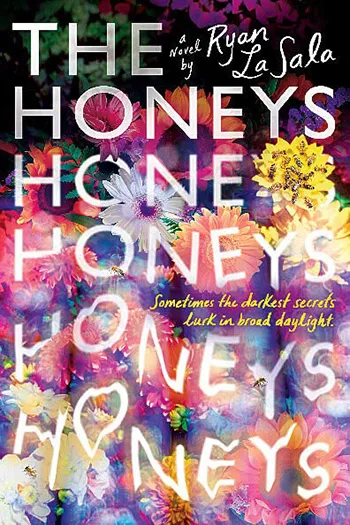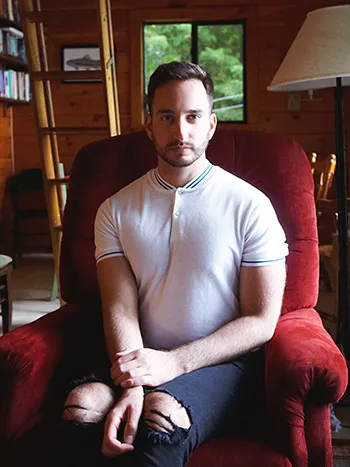The greatest horror stories come from a place of deep fear, a personal dissection of some of the most frightening elements of life masked by the metaphysical. Often, what makes horror so enticing is the way the genre unpacks very real emotions and fears.
For author Ryan La Sala, though, writing a horror novel goes deeper than just examining basic human fears. When they set out to write their latest novel, The Honeys, La Sala knew they wanted to create a fresh take on the horror genre, and craft a novel that was entirely Queer.
A truly Queer horror story
"All of my books fit into this idea where I am trying to revise the anthology of Queer characters and write stories that only Queer characters can tell," La Sala said. "Mars [the main character] was always going to be super Queer in their design and also in their intentions and the way they problem-solve. The Honeys couldn't happen to a straight character. A straight character or a straight hero would not have survived, and that's why it's Mars' story to tell."

The Honeys takes a deep dive into the ways gender identity and performance affect how people view themselves and others. Throughout the novel, La Sala examines the perceived dichotomies of gender both through their gender-fluid protagonist, Mars, and the overtly feminine mean girls, "The Honeys."
Writing a horror novel that tackles the nuances of gender in such an overt way was revolutionary to the genre. For La Sala, the challenge was particularly complex, as they had to balance truth-telling and fiction. "When people look at the job of a writer, they think fiction is the task of lying, telling an untruth of things" they said.
"But I think it's the reverse. Even if you're writing fantasy, even if you're writing horror that no one has ever dealt with before, and creatures that don't belong to this world, [you] have to be underpinned by honesty. You're telling a larger truth that is perhaps too ephemeral or too delicate to put into the bracing terms of reality."
The truth was the most important thing for La Sala to keep in mind when writing a Queer novel. Unlike some LGBTQ+ authors, they wanted to create not just a Queer protagonist but a story that is innately Queer, and could not be told through the perspective of a cis-het character.
"Mars is dealing with something that no one in our world has ever dealt with," La Sala said, "but he's doing it in his way and he's going about it in a manner that makes sense to a Queer person. His problem-solving, for instance, has a lot to do with the fact that, as a gender-fluid person who uses all sorts of pronouns in the book, he has studied from afar the way that that behavior is often gendered and the way that behavior and gender are performed in a really specific way."
Not only is Mars' gender identity normalized, but it is also seen as a tool, or superpower, that allows them to be the hero of their story. "That's why Mars, out of all the people in this novel," La Sala added, "is the only one to think that the Honeys Рthe girls who the book is named after Рmight be hiding something behind this fa̤ade of frivolity and girlishness. Society in general has this sort of pathological dismissal of the way that girls behave and are friends with one another, and that's why the Honeys... get away with what they're doing. But it takes someone like Mars, someone who is Queer, to look at their behavior and know it for the camouflage that it is."
"What happens to us in dreams?"
The idea for The Honeys was always sitting in the back of La Sala's mind, but before they were ready to write this novel, they knew they had other stories to tell.

From a young age, La Sala knew they wanted to write Queer stories. "I started my first novel out of spite, which I know is an unflattering way to describe an artistic process," they joked. "As a teenager, I was reading what was meant for me: other YA titles like Twilight and The Hunger Games. I couldn't find Queer people in those books, and I kept asking myself, 'What happens to us in dreams, in fantasy, in the future?' so I started writing my book to answer that question."
Their first book, Reverie, brings queerness to the sci-fi genre, following a mind-bending simulation plot. "[Reverie] became the Gayest form of self-insert fan fiction you could think of. For years, I played in that world, until I decided I wanted to try and get it published and let other people in."
Once La Sala decided to seek publication, they encountered some of the harsh realities that face LGBTQ+ authors. "I worked on it for a long time," they said. "People told me to start other projects, to start trying to sell something that wasn't as flamboyant. But I was pretty dedicated to my mission of writing something as Queer as my own life, and I'm glad [I did], because it ended up being a remarkable success, especially considering that a lot of people didn't think it was going to sell anywhere."
In demand
By the time they were ready to write The Honeys, La Sala had created a name in the publishing world. They no longer had to fight and claw just for someone to give their novel a chance.
"The Honeys was the complete opposite of Reverie. Reverie was rejected even though I had the whole book written. People looked at the entirety of it and said, 'No, this isn't good enough.' By the time I was up to The Honeys, I had only written about 4,000 words... before it got picked up by a publisher."
Not only did The Honeys get picked up quickly, but publishers were fighting over who would get the rights to the story. "It was highly [in demand], and it ended up inciting a thirteen-in print auction in publishing, which was a complete reversal of [the] situation with my first book where ... I had to fight tooth and nail to show that there was a demand for Queer characters in fantasy.
"So, The Honeys was remarkably different, and the process of writing it was different too, because instead of having all the time in the world to perfect it, I only had about a month or so to write it."
Due to the high demand for the book, La Sala had to put their life on hold to finish it in time for publication. "I was so busy with my full-time job at the time, and all the other books I had put out, that I ended up having to quit my job to spend my time writing the book... I had to be a lot faster and a lot more organized."
While the work they put in with their earlier novels helped The Honeys fly, La Sala is not apt to take all the credit for their success. "I attribute [the book's success] both to the hard work I put into my first two books, [and] also the work that a lot of creators have put in before me and while I was on the rise to bring attention to the fact that Queer characters deserve to be in their own stories, and deserve to have their own experiences outside of the traumatic process of coming out.
"So, I am very aware that The Honeys' success is the articulated point of a blade that has been welded over, at this point, centuries, by many Queer people giving their energy to the cause and making sure we get to be seen."
Writing through grief
The story and the character of Mars were loosely inspired by La Sala and the experiences they had gone through.
"Mars and I share a lot, including grief, being gender fluid, and also going to summer camps. But Mars as a character is a form of poetic justice for the person I wish I was when I was having those experiences. Mars deals with a lot more harsh horrors than I do, and did."
While Mars may have started as a version of La Sala, they realized that the character would need to speak to a wider audience. In the final drafts of the novel, Mars became the person La Sala wishes they were, and a character they are sure many readers will need to see.
"At the end of the day, Mars is also a much stronger person than I am and I was," said La Sala. "Mars is that way because Mars has, now, the attention of thousands and thousands of young readers, so Mars has to be a much more durable and articulate person than I... got to be, and I got to learn a lot about myself writing that character."
While their idea for The Honeys mulled in the back of their head for years, it took La Sala's own experiences with tragedy to understand just how they wanted to write the story.
"The book has a lot to do with grief and dimensions, and things that we can't see that are still there, things that are gone but we still feel near us," they said. "That's a lot, because, like the main character Mars, I have also dealt with losing a sibling in a very sudden manner.
"When I set out to write The Honeys, it was largely in part because I wanted to take my skill set to this mythological metaphor and use it as a form of therapy to talk to myself about the grief that I hadn't processed when my sister passed away suddenly.
"It was in 2018, it was right when Reverie was getting picked up. I remember I was at my sister's memorial service when I got the news I was going to be a published author. It was a totally weird thing... my dreams were coming true, but it was also during the worst time in my life.
"I've had [The Honeys] in my head since well before my sister passed away, but it took that experience for the book to make sense and to give me the urgency to write it."
When working on healing through their grief, La Sala found solace in nature.
"I've always been very inspired by all the small, minified dramas that happen all around us in nature. Bees, specifically, are very fascinating insects to me. All cultures... have mythologies around bees, but one specific thing between cultures that have very little contact with each other is that bees are... seen as a mystical emissary between worlds and the afterlife."
This connection between bees, grief, and spirituality led La Sala to explore more of the ideas that would eventually become The Honeys.
Why write horror?
La Sala hopes that readers leave The Honeys with a different perspective on the world.
"I can't always anticipate who is going to read my book and who will find themselves taking it on, but I hope that ultimately the book finds its way into the hands of whoever needs it most. Those hands could be Queer, those hands could be questioning, and those hands could be grieving, depending on where those people are. And it could be all three."
La Sala also hopes their novel inspires readers to look deeper at the ways society has taught people to internalize gender.
"I hope people walk away with a renewed skepticism on gender and the performance of gender," they said. "Gender is this construct that everyone performs every single day. I would consider my book a success if you start to examine your behaviors and start to question the compulsory nature of those performances. That's sort of why I wrote Mars as a gender-fluid character, but also the Honeys themselves are so sweetly defined as feminine despite the wickedness of their ways.
"I included a lot in the book, because I wanted it to make sense to all kinds of people going through different things, and I wanted it to make a little bit more sense the more people read it. I hope people walk away with a new sense of what it means to be a Queer teenager, but I also hope that people walk away with some of the glory that I try to include around the natural world."
For La Sala, writing horror is about more than just scaring readers, although unlocking new fears is always a good bonus.
"A big part of why I write horror is because I want to shake people up into new shapes, and maybe teach them something about the fears that propel them," they said. "Ultimately I'm here to entertain, so if you take nothing else from the book, my goal is that you walk away scared of bees."
A look ahead
The Honeys is La Sala's debut in the horror genre, but they don't see themselves leaving anytime soon.
"To be honest, I think I've always been on my way to telling darker stories. I love writing about my fears; it's the way that I know how to deal with my fear. I take it out of my head and pin its wings wide, like you might a butterfly, and just study it that way. The Honeys is an examination of a lot of the things that scare me, and I think I'll be in horror for a long time because a lot of things still scare me.
"Fans can count on seeing more spookiness and more thrills, although, at least for the next book, we're leaving the bees behind, and I'm focusing on a whole host of other creatures that scare me, including humans," they said with a laugh.
La Sala's next novel is still pretty top secret, but they can disclose that it will take place in New York City. "As far as I know, and as far as I'm intending, it's a horror novel. A supernatural thriller, I think, would probably be the more accurate term for it."
They anticipate finishing up their novel this fall between fun, spooky activities. "I'm looking forward to finishing my next book and turning it in, so I can finally start talking about it with readers. I am looking forward to potentially continuing Mars' story and the Honeys, which is something I have thought a lot about since the book came out, but haven't put any words on paper."
"I'm looking forward to the traditions of autumn," they added. Some La Sala autumn traditions include apple picking, carving pumpkins, and spending time with friends in a woodsy cabin. "It is something we do every year, and inspired the Honeys and their hut in the woods," they said.
For anyone looking for a truly spooky Queer read that will leave you with lingering questions about the dissection of gender dichotomies and binaries, The Honeys is a perfect addition to any Halloween reading list.


